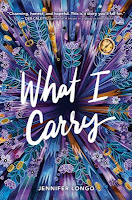Hey, friends!
Toothbrush? Yes.
Socks? Yes.
Emotional attachment to friends? foster families? a boyfriend? Nope!
There's no room for any additional baggage.
Muir has just one year left before she ages out of the system. One year before she's free. One year to avoid anything--or anyone--that could get in her way.
Then she meets Francine. And Kira. And Sean.
And everything changes.
Melati Ahmad looks like your typical moviegoing, Beatles-obsessed sixteen-year-old. Unlike most other sixteen-year-olds though, Mel also believes that she harbors a djinn inside her, one who threatens her with horrific images of her mother’s death unless she adheres to an elaborate ritual of counting and tapping to keep him satisfied.
But there are things that Melati can't protect her mother from. On the evening of May 13th, 1969, racial tensions in her home city of Kuala Lumpur boil over. The Chinese and Malays are at war, and Mel and her mother become separated by a city in flames.
With a 24-hour curfew in place and all lines of communication down, it will take the help of a Chinese boy named Vincent and all of the courage and grit in Melati’s arsenal to overcome the violence on the streets, her own prejudices, and her djinn’s surging power to make it back to the one person she can’t risk losing.
**Content warnings: Racism, graphic violence, on-page death, OCD and anxiety triggers.**
Pulitzer Prize–winning poet Natasha Trethewey explores this profound experience of pain, loss, and grief as an entry point into understanding the tragic course of her mother’s life and the way her own life has been shaped by a legacy of fierce love and resilience. Moving through her mother’s history in the deeply segregated South and through her own girlhood as a “child of miscegenation” in Mississippi, Trethewey plumbs her sense of dislocation and displacement in the lead-up to the harrowing crime that took place on Memorial Drive in Atlanta in 1985.
This astonishing novel about the interwoven lives of those bound to a plantation in antebellum America is an epic masterwork—empathetic, brutal, and entirely human.
1860, Louisiana. After serving as mistress of Le Petit Cottage for more than six decades, Madame Sylvie Guilbert has decided, in spite of her family’s indifference, to sit for a portrait.
But there are other important stories to be told on the Guilbert plantation. Stories that span generations, from the big house to out in the fields, of routine horrors, secrets buried as deep as the family fortune, and the tangled bonds of descendants and enslaved.
Eli and Anna have each gotten used to telling lies as a means of survival, but as they navigate a world without their mother, they must learn how to accept help, and let other people in.
Because Michael was the first person to see it, he's the first suspect. Because Link is one of the most popular guys in school, everyone's looking to him to figure it out. And because Dana's the only Jewish girl in the whole town, everyone's treating her more like an outsider than ever.
The mystery deepens as more swastikas begin to appear. Some students decide to fight back and start a project to bring people together instead of dividing them further. The closer Link, Michael, and Dana get to the truth, the more there is to face-not just the crimes of the present, but the crimes of the past.
Part memoir, part historical and cultural analysis, My Vanishing Country is an eye-opening journey through the South's past, present, and future.
Anchored in in Bakari Sellers' hometown of Denmark, South Carolina, Country illuminates the pride and pain that continues to fertilize the soil of one of the poorest states in the nation. He traces his father’s rise to become a friend of Stokely Carmichael and Martin Luther King, a civil rights hero, and a member of the Student Non-Violent Coordinating Committee (SNCC), to explore the plight of the South's dwindling rural, black working class―many of whom can trace their ancestry back for seven generations.
In his poetic personal history, we are awakened to the crisis affecting the other “Forgotten Men & Women,” who the media seldom acknowledges. For Sellers, these are his family members, neighbors, and friends. He humanizes the struggles that shape their lives: to gain access to healthcare as rural hospitals disappear; to make ends meet as the factories they have relied on shut down and move overseas; to hold on to precious traditions as their towns erode; to forge a path forward without succumbing to despair.
My Vanishing Country is also a love letter to fatherhood―to Sellers' father, his lodestar, whose life lessons have shaped him, and to his newborn twins, who he hopes will embrace the Sellers family name and honor its legacy.
The Burning: Black Wall Street and the Tulsa Race Massacre of 1921 by Tim Madigan, adapted by Hilary Beard for young adults * Young adult - 7th grade and up
The Burning recreates Greenwood at the height of its prosperity, explores the currents of hatred, racism, and mistrust between its Black residents and Tulsa's White population, narrates events leading up to and including Greenwood's devastation, and documents the subsequent silence that surrounded this tragedy. Delving into history that's long been pushed aside, this is the true story of Black Wall Street and the Tulsa Race Massacre, with updates that connect the historical significance of the massacre to the ongoing struggle for racial justice in America.
This adaptation is for ages 12-18.
Ten: three little letters, one ordinary number. No big deal, right? But for Troy Hayes, a 16-year-old suffering from Tourette Syndrome and Obsessive-Compulsive Disorder, the number ten dictates his life, forcing him to do everything by its exacting rhythm. Finally, fed up with the daily humiliation, loneliness, and physical pain he endures, Troy writes a list of ten things to do by the tenth anniversary of his diagnosis—culminating in suicide on the actual day. But the process of working his way through the list changes Troy’s life: he becomes friends with Khory, a smart, beautiful classmate who has her own troubled history. Khory unwittingly helps Troy cross off items on his list, moving him ever closer to his grand finale, even as she shows him that life may have more possibilities than he imagined. This is a dark, intense story, but it’s also realistic, hopeful, and deeply authentic.
But on the day of the ceremony, her blood runs gold, the color of impurity--and Deka knows she will face a consequence worse than death.
Then a mysterious woman comes to her with a choice: stay in the village and submit to her fate, or leave to fight for the emperor in an army of girls just like her. They are called alaki--near-immortals with rare gifts. And they are the only ones who can stop the empire's greatest threat.
Knowing the dangers that lie ahead yet yearning for acceptance, Deka decides to leave the only life she's ever known. But as she journeys to the capital to train for the biggest battle of her life, she will discover that the great walled city holds many surprises. Nothing and no one are quite what they seem to be--not even Deka herself.
Omar and his little brother, Hassan, arrived in Dadaab, a refugee camp in Kenya, seven years ago. Their father was killed the day they left home, and they haven't seen their mother since they joined their neighbors who were fleeing to Dadaab. Now Omar is eleven and Hassan is nine, and Omar has quit school to look after his brother, who has an intellectual disability.
When Omar is given the opportunity to return to school and carve out a future for himself and Hassan, he feels torn. He loves school and could have the opportunity to earn a coveted scholarship to a North American university--and with it a visa for himself and Hassan. But is it worth the risk and heartache of leaving his vulnerable brother for hours each day?
Told in Victoria Jamieson's engaging and accessible graphic-novel style and based on Omar Mohamed's gripping true story, this book is an intimate, important look at day-to-day life in a refugee camp.
The Brave is about a boy with an OCD issue and his move to a reservation to live with his biological mother.
Collin can't help himself—he has a unique condition that finds him counting every letter spoken to him. It's a quirk that makes him a prime target for bullies, and a continual frustration to the adults around him, including his father.
When Collin asked to leave yet another school, his dad decides to send him to live in Minnesota with the mother he's never met. She is Ojibwe, and lives on a reservation. Collin arrives in Duluth with his loyal dog, Seven, and quickly finds his mom and his new home to be warm, welcoming, and accepting of his condition.
Collin’s quirk is matched by that of his neighbor, Orenda, girl who lives mostly in her treehouse and believes she is turning into a butterfly. With Orenda’s help, Collin works hard to overcome his challenges. His real test comes when he must step up for his new friend and trust his new family.















No comments:
Post a Comment